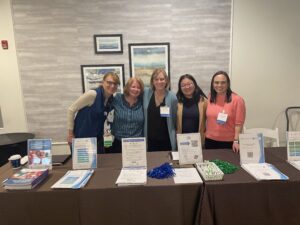On Wednesday, May 21, the Celiac Disease Foundation partnered with Boston Children’s Hospital and the Massachusetts Department of Elementary and Secondary Education to deliver a critical educational seminar at the Healthy Kids, Healthy Programs Summit, hosted by the John C. Stalker Institute of Food and Nutrition. This collaborative session brought together school nutrition professionals from across Massachusetts to address a growing need: how to safely, confidently, and inclusively serve gluten-free meals to students with celiac disease.

The presentation, Confidence in Accommodation: Gluten-Free Diet in Schools, offered practical strategies to eliminate barriers and improve access to school meals for children with celiac disease. Importantly, it translated cutting-edge research into actionable solutions.
Dr. Nan Du of Boston Children’s Hospital presented compelling findings from her recent study, which revealed that 50% of families with a positive screen for food insecurity were not participating in the free school meals program, even though they qualified. Additionally, 1 in 6 students with celiac disease did not have a 504 Plan in place, which is critical for securing necessary dietary accommodations under federal law.
The top reasons families reported for opting out of free meals included:
- Lack of trust and confidence in the school cafeteria (52%)
- Child not liking what is being served (62%)
- Poor communication about gluten-free options at school (40%)
- Concerns about gluten cross-contact in the cafeteria (45%)
- Limited variety of gluten-free offerings (75%)
This seminar allowed us to move Dr. Du’s research into real-world action, helping schools understand the barriers students face and offering clear strategies to overcome them. Attendees learned how simple changes in preparation, communication, and menu design can dramatically increase meal participation and inclusion for students with celiac disease.
Complementing the research, Sharon Weston, RD, provided a clinical overview of celiac disease and practical guidance on preparing balanced gluten-free meals while preventing cross-contact. Parent advocate Suzanne Ducasse shared the emotional and social challenges families face in school settings, underscoring the need for inclusive practices. Finally, the Foundation’s Chief Education and Community Engagement Officer, Vanessa Weisbrod, presented real-world success stories from Massachusetts schools and offered actionable strategies to strengthen communication, build trust, and meet federal dietary accommodation requirements.
As a next step, the Foundation is launching a pilot program in partnership with Boston Children’s Hospital and the Massachusetts Department of Elementary and Secondary Education to create Safe School Meals for Students with Celiac Disease, an online education platform designed to provide regular, accessible training for school food service providers. The training includes four interactive modules:
- Celiac Disease and Gluten-Free Dietary Requirements
- Safe Food Handling and Cross-Contact Prevention
- Planning and Sourcing Gluten-Free School Meals
- Effective Communication with Students, Families, and Staff
Participants will gain access to downloadable resources, earn a DESE-recognized certificate of completion, and be listed in a state registry of trained providers. This scalable model will help establish a consistent standard of care across the state and perhaps expand to other states too.
The Foundation remains deeply committed to supporting school communities. Together, we are building a future where every student with celiac disease can eat safely and thrive.
To access free tools and resources, including national school guidelines, sample 504 plans, and training modules—visit https://celiac.org/school-support-sessions/